Difference between revisions of "Manuals:MBPlusFblV52:Radio System"
Shornstein (talk | contribs) |
Shornstein (talk | contribs) (Marked this version for translation) |
||
| (4 intermediate revisions by the same user not shown) | |||
| Line 8: | Line 8: | ||
<!--T:11--> | <!--T:11--> | ||
| − | MICROBEAST PLUS can work with a lot of different receiver types and radio brands, especially with different types of radio signal protocols. Depending on which signal protocol and receiver you intend to use, the wiring layout may vary. In the following you can see all supported protocols and specific wiring schemes for each receiver type. '''Ensure a tight fit of the connectors.''' The pin board of MICROBEAST PLUS is designed so that the plugs firmly clamp each other when they are fully inserted. Anyhow, especially when using a receiver with single wire output it is possible that connectors are plugged in with no adjacent neighbors. Such plugs should additionally be secured against loosening.<br /> | + | MICROBEAST PLUS can work with a lot of different receiver types and radio brands, especially with different types of radio signal protocols. Depending on which signal protocol and receiver you intend to use, the wiring layout may vary. In the following you can see all supported protocols and specific wiring schemes for each receiver type.<br /> |
| + | <br /> | ||
| + | [[File:Warning.png|18px|sub]] '''Ensure a tight fit of the connectors.''' The pin board of MICROBEAST PLUS is designed so that the plugs firmly clamp each other when they are fully inserted. Anyhow, especially when using a receiver with single wire output it is possible that connectors are plugged in with no adjacent neighbors. Such plugs should additionally be secured against loosening.<br /> | ||
<br /> | <br /> | ||
<br /> | <br /> | ||
=Standard receiver= <!--T:4--> | =Standard receiver= <!--T:4--> | ||
| − | A | + | A receiver with multiple servo output connectors is what we consider a "Standard receiver". Here you connect each servo output to one control function of MICROBEAST PLUS by using one wire for each function. The 5 control functions (wires) are: Aileron, Elevator, Rudder, Collective pitch and Gyro gain. If you don't know which stick controls which channel have a look at your radio's servo monitor, refer to your radios instruction manual or simply connect a servo to test what each output is used for!<br /> |
<br /> | <br /> | ||
{|cellspacing = "20" | {|cellspacing = "20" | ||
|style="text-align:center;"| [[Image:Standard_RX.png|250px]] | |style="text-align:center;"| [[Image:Standard_RX.png|250px]] | ||
|}<br /> | |}<br /> | ||
| − | Here we show connection layouts for two common radio brands. Note that this is only exemplary, | + | Here we show connection layouts for two common radio brands. Note that this is only exemplary, you can use any radio system on the market, not only these two brands! Anyhow, make sure that you connect the wires to the correct functions as mentioned above. |
{|cellspacing = "20" | {|cellspacing = "20" | ||
|[[Image:Spektrum_RX.png|x100px]] | |[[Image:Spektrum_RX.png|x100px]] | ||
| Line 24: | Line 26: | ||
|}<br /> | |}<br /> | ||
{{QUOTE| | {{QUOTE| | ||
| − | * The wires for rudder, pitch and gyro are signal wires. | + | * The wires for rudder, pitch and gyro are all signal wires. Although some have different color, they must be placed on the same receiver side as the the orange wires from aileron and elevator! |
* You must connect all 5 functions/wires to the receiver. When you don't connect all wires, the system will not finish initialization sequence! | * You must connect all 5 functions/wires to the receiver. When you don't connect all wires, the system will not finish initialization sequence! | ||
| − | * The throttle servo/speed controller is connected to the receiver's throttle output. | + | * The throttle servo/speed controller is connected to the receiver's throttle output. So using the headspeed '''governor function''' of MICROBEAST PLUS is '''not possible''' in combination with a Standard receiver!}}<br /> |
<br /> | <br /> | ||
<br /> | <br /> | ||
=Receivers with single wire output= <!--T:5--> | =Receivers with single wire output= <!--T:5--> | ||
| − | A single-line receiver transmits | + | A single-line receiver transmits all control functions over one single connection wire to MICROBEAST PLUS. This is done by packing all channel outputs into a digital data paket or by chaining the signals onto one line.<br /> |
| + | MICROBEAST PLUS supports the following systems '''with telemetry uplink''': | ||
| + | * Spektrum® SRXL2 | ||
| + | * JETI® EXBUS | ||
| + | * GRAUPNER® HOTT | ||
<br /> | <br /> | ||
| − | + | MICROBEAST PLUS supports the following systems '''without telemetry''': | |
| + | * Spektrum® DSMX/DSM2 remote receivers and receivers with SRXL output | ||
| + | * Futaba® SBUS (1 & 2) | ||
| + | * Multiplex® SRXL | ||
| + | * JR® X-Bus (Mode B) | ||
| + | * Jeti® UDI | ||
| + | * ALIGN® and FlySky® iBus | ||
| + | * any SPPM (serial ppm) receiver .<br /> | ||
<br /> | <br /> | ||
| − | <!--T:9--> | + | == Single wire without telemetry == <!--T:9--> |
* The single-line connection wire is plugged into the [DI1] input of MICROBEAST PLUS | * The single-line connection wire is plugged into the [DI1] input of MICROBEAST PLUS | ||
* The throttle servo or ESC is connected to the [CH5] output. When using a speed controller with BEC, from here the power will be distributed to receiver and servos. | * The throttle servo or ESC is connected to the [CH5] output. When using a speed controller with BEC, from here the power will be distributed to receiver and servos. | ||
| − | * | + | * You can connect a power supply (second BEC wire, battery) to the [SYS] port and/or to the receiver (in case this has additional servo or battery ports). All servo ports will form a parallel power circuit (except the port [RUD|PIT|AUX]; please do not connect anything here!).<br /> |
<br /> | <br /> | ||
{|cellspacing="20" style="text-align:center;" | {|cellspacing="20" style="text-align:center;" | ||
| Line 49: | Line 62: | ||
<!--T:10--> | <!--T:10--> | ||
| − | '''When using a big heli with standard size servos it may be insufficient to only provide power at the [SYS] port or receiver.''' Adding additional power wires is highly recommended! If there are no other ports left to additionally feed in power, we recommend using the MICROBEAST PLUS HD which comes witch an additional high power input. This reduces wiring resistance and serves todays demands for a robust servo power supply.<br /> | + | [[File:Warning.png|18px|sub]] '''When using a big heli with standard size servos it may be insufficient to only provide power at the [SYS] port or receiver.''' Adding additional power wires is highly recommended! If there are no other ports left to additionally feed in power, we recommend using the MICROBEAST PLUS HD which comes witch an additional high power input. This reduces wiring resistance and serves todays demands for a robust servo power supply.<br /> |
<br /> | <br /> | ||
<br /> | <br /> | ||
| − | + | <!--T:6--> | |
| − | + | '''Remote receivers''' (Spektrum® DSMX/DSM2, JR® DMSS, ALIGN® iBus) can be directly connected to the white pin board at the side of MICROBEAST ULTRA. Here the receiver will be powered with a stabilized voltage of 3.3 Volts! Voltage is the first pin from the front/right, Minus is the second pin from the right, Signal is connected at the third pin from the right.<br /> | |
<br /> | <br /> | ||
| − | '''Please note:''' MICROBEAST PLUS | + | '''Please note:''' MICROBEAST PLUS doesn't support connecting more than one remote satellite at a time!<br /> |
<br /> | <br /> | ||
{|cellspacing="20" style="text-align:center;" | {|cellspacing="20" style="text-align:center;" | ||
| Line 66: | Line 79: | ||
|} | |} | ||
<br /> | <br /> | ||
| − | + | {{WARNING_QUOTE|'''Using a remote satellite is only recommended for small rc models (helicopters of 450 size or smaller).''' Due to the design, one single receiving unit is more prone to radio interference and can result in reduced transmission range!}}<br /> | |
| − | |||
| − | {{WARNING_QUOTE|'''Using a remote satellite is only recommended for small rc | ||
<br /> | <br /> | ||
<br /> | <br /> | ||
| − | = | + | == Single wire with telemetry == <!--T:7--> |
| − | ''' | + | Receivers with bidirectional telemetry uplink (Spektrum® SRXL2 & Jeti® EXBUS) must be connected to the pin board at the side of MICROBEAST PLUS. To connect a receiver with standard servo connectors, i.e. the SPEKTRUM® '''AR6610T''', '''AR8020T''' or JETI EXBUS receivers, you need an adapter from servo plug to JST-ZH type. We offer a special adapter if needed - Order nr. BXA76403. Voltage is the first pin from the left, Signal is connected at the third pin from the left. Minus is the second pin from the front/right.<br /> |
| − | <br /> | + | * When '''telemetry is not in use''', the throttle servo or ESC is connected to the '''[AIL|CH5]''' port. |
| − | + | * When using a telemetry receiver and an '''ESC with telemetry''' data connector, the ESC is connected to '''[ELE|DI1]'''. The data signal of the ESC is connected to '''[AIL|CH5]'''. (You will get further information about connecting the speed controller and setting up telemetry on the next page!) | |
| − | + | * You can connect a power supply (second BEC wire, battery) to the [SYS] port and/or to the receiver (in case this has additional servo or battery ports). All servo ports will form a parallel power circuit (except the port [RUD|PIT|AUX]; please do not connect anything here!).<br /> | |
| − | When using a | ||
| − | <br /> | ||
<br /> | <br /> | ||
| − | '' | + | [[File:Warning.png|18px|sub]] '''When using a big heli with standard size servos it may be insufficient to only provide power at the [SYS] port or receiver.''' Adding additional power wires is highly recommended! If there are no other ports left to additionally feed in power, we recommend using the MICROBEAST PLUS HD which comes witch an additional high power input. This reduces wiring resistance and serves todays demands for a robust servo power supply.<br /> |
<br /> | <br /> | ||
| − | |||
{|cellspacing="50" style="text-align:center;" | {|cellspacing="50" style="text-align:center;" | ||
|[[Image:SRXL2 AR6610T en.png| x150px]] | |[[Image:SRXL2 AR6610T en.png| x150px]] | ||
| Line 89: | Line 97: | ||
|} | |} | ||
<br /> | <br /> | ||
| − | |||
<br /> | <br /> | ||
| − | To connect a SRXL2 receiver like '''SPM4650/SPM4651T it is necessary to INTERCHANGE THE WIRES of the supplied 4-pin receiver connector'''. In this configuration you can directly plug in the receiver without the need for an extra adapter. But be very careful! Make sure plus and minus are placed properly! The signal wire is connected at the fourth pin from the front/right, minus ist second pin from the front/right, voltage (+3.3V) is the first pin from the front/right. On satellite side the signal output is on the outer side, the pin next to it is not used, then we have voltage and on the inner side comes minus.<br /> | + | To connect a '''SRXL2 remote receiver''' like '''SPM4650/SPM4651T''' it is necessary to '''INTERCHANGE THE WIRES of the supplied 4-pin receiver connector'''. In this configuration you can directly plug in the receiver without the need for an extra adapter. But be very careful! Make sure plus and minus are placed properly! The signal wire is connected at the fourth pin from the front/right, minus ist second pin from the front/right, voltage (+3.3V) is the first pin from the front/right. On satellite side the signal output is on the outer side, the pin next to it is not used, then we have voltage and on the inner side comes minus.<br /> |
{|cellspacing="50" style="text-align:center;" | {|cellspacing="50" style="text-align:center;" | ||
|[[Image:SRXL2 Satellite en.png| x180px]] | |[[Image:SRXL2 Satellite en.png| x180px]] | ||
| Line 99: | Line 106: | ||
| Modified 4-pin SRXL connector | | Modified 4-pin SRXL connector | ||
|} | |} | ||
| − | {{WARNING_QUOTE|'''Never connect the 4-pin receiver connector to MICROBEAST | + | {{WARNING_QUOTE|'''Never connect the 4-pin receiver connector to MICROBEAST ULTRA without modification and in wrong polarity! This will damage your receiver immediately!''' Check polarity at least twice before connecting the receiver to MICROBEAST PLUS. It is up to you to make sure polarity is correct. We do not assume any liability in case you do it wrong.}}<br /> |
<br /> | <br /> | ||
<br /> | <br /> | ||
</translate> | </translate> | ||
Latest revision as of 10:37, 23 February 2023
MICROBEAST PLUS can work with a lot of different receiver types and radio brands, especially with different types of radio signal protocols. Depending on which signal protocol and receiver you intend to use, the wiring layout may vary. In the following you can see all supported protocols and specific wiring schemes for each receiver type.
![]() Ensure a tight fit of the connectors. The pin board of MICROBEAST PLUS is designed so that the plugs firmly clamp each other when they are fully inserted. Anyhow, especially when using a receiver with single wire output it is possible that connectors are plugged in with no adjacent neighbors. Such plugs should additionally be secured against loosening.
Ensure a tight fit of the connectors. The pin board of MICROBEAST PLUS is designed so that the plugs firmly clamp each other when they are fully inserted. Anyhow, especially when using a receiver with single wire output it is possible that connectors are plugged in with no adjacent neighbors. Such plugs should additionally be secured against loosening.
Standard receiver
A receiver with multiple servo output connectors is what we consider a "Standard receiver". Here you connect each servo output to one control function of MICROBEAST PLUS by using one wire for each function. The 5 control functions (wires) are: Aileron, Elevator, Rudder, Collective pitch and Gyro gain. If you don't know which stick controls which channel have a look at your radio's servo monitor, refer to your radios instruction manual or simply connect a servo to test what each output is used for!
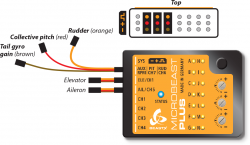
|
Here we show connection layouts for two common radio brands. Note that this is only exemplary, you can use any radio system on the market, not only these two brands! Anyhow, make sure that you connect the wires to the correct functions as mentioned above.

|

|
- The wires for rudder, pitch and gyro are all signal wires. Although some have different color, they must be placed on the same receiver side as the the orange wires from aileron and elevator!
- You must connect all 5 functions/wires to the receiver. When you don't connect all wires, the system will not finish initialization sequence!
- The throttle servo/speed controller is connected to the receiver's throttle output. So using the headspeed governor function of MICROBEAST PLUS is not possible in combination with a Standard receiver!
Receivers with single wire output
A single-line receiver transmits all control functions over one single connection wire to MICROBEAST PLUS. This is done by packing all channel outputs into a digital data paket or by chaining the signals onto one line.
MICROBEAST PLUS supports the following systems with telemetry uplink:
- Spektrum® SRXL2
- JETI® EXBUS
- GRAUPNER® HOTT
MICROBEAST PLUS supports the following systems without telemetry:
- Spektrum® DSMX/DSM2 remote receivers and receivers with SRXL output
- Futaba® SBUS (1 & 2)
- Multiplex® SRXL
- JR® X-Bus (Mode B)
- Jeti® UDI
- ALIGN® and FlySky® iBus
- any SPPM (serial ppm) receiver .
Single wire without telemetry
- The single-line connection wire is plugged into the [DI1] input of MICROBEAST PLUS
- The throttle servo or ESC is connected to the [CH5] output. When using a speed controller with BEC, from here the power will be distributed to receiver and servos.
- You can connect a power supply (second BEC wire, battery) to the [SYS] port and/or to the receiver (in case this has additional servo or battery ports). All servo ports will form a parallel power circuit (except the port [RUD|PIT|AUX]; please do not connect anything here!).
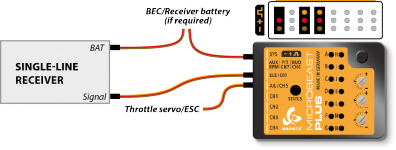
|
| Single-line receiver with additional servo output channels |
![]() When using a big heli with standard size servos it may be insufficient to only provide power at the [SYS] port or receiver. Adding additional power wires is highly recommended! If there are no other ports left to additionally feed in power, we recommend using the MICROBEAST PLUS HD which comes witch an additional high power input. This reduces wiring resistance and serves todays demands for a robust servo power supply.
When using a big heli with standard size servos it may be insufficient to only provide power at the [SYS] port or receiver. Adding additional power wires is highly recommended! If there are no other ports left to additionally feed in power, we recommend using the MICROBEAST PLUS HD which comes witch an additional high power input. This reduces wiring resistance and serves todays demands for a robust servo power supply.
Remote receivers (Spektrum® DSMX/DSM2, JR® DMSS, ALIGN® iBus) can be directly connected to the white pin board at the side of MICROBEAST ULTRA. Here the receiver will be powered with a stabilized voltage of 3.3 Volts! Voltage is the first pin from the front/right, Minus is the second pin from the right, Signal is connected at the third pin from the right.
Please note: MICROBEAST PLUS doesn't support connecting more than one remote satellite at a time!
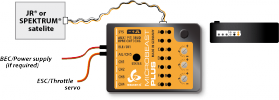
|
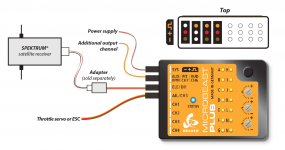
|
| JR®/Spektrum® remote satellite connected at side pin board | JR®/Spektrum® remote satellite connection with power adapter |
Using a remote satellite is only recommended for small rc models (helicopters of 450 size or smaller). Due to the design, one single receiving unit is more prone to radio interference and can result in reduced transmission range!
Single wire with telemetry
Receivers with bidirectional telemetry uplink (Spektrum® SRXL2 & Jeti® EXBUS) must be connected to the pin board at the side of MICROBEAST PLUS. To connect a receiver with standard servo connectors, i.e. the SPEKTRUM® AR6610T, AR8020T or JETI EXBUS receivers, you need an adapter from servo plug to JST-ZH type. We offer a special adapter if needed - Order nr. BXA76403. Voltage is the first pin from the left, Signal is connected at the third pin from the left. Minus is the second pin from the front/right.
- When telemetry is not in use, the throttle servo or ESC is connected to the [AIL|CH5] port.
- When using a telemetry receiver and an ESC with telemetry data connector, the ESC is connected to [ELE|DI1]. The data signal of the ESC is connected to [AIL|CH5]. (You will get further information about connecting the speed controller and setting up telemetry on the next page!)
- You can connect a power supply (second BEC wire, battery) to the [SYS] port and/or to the receiver (in case this has additional servo or battery ports). All servo ports will form a parallel power circuit (except the port [RUD|PIT|AUX]; please do not connect anything here!).
![]() When using a big heli with standard size servos it may be insufficient to only provide power at the [SYS] port or receiver. Adding additional power wires is highly recommended! If there are no other ports left to additionally feed in power, we recommend using the MICROBEAST PLUS HD which comes witch an additional high power input. This reduces wiring resistance and serves todays demands for a robust servo power supply.
When using a big heli with standard size servos it may be insufficient to only provide power at the [SYS] port or receiver. Adding additional power wires is highly recommended! If there are no other ports left to additionally feed in power, we recommend using the MICROBEAST PLUS HD which comes witch an additional high power input. This reduces wiring resistance and serves todays demands for a robust servo power supply.
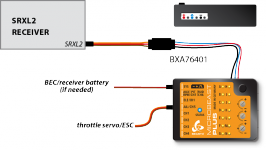
|
| SRXL2 receiver with standard servo connector and adapter |
To connect a SRXL2 remote receiver like SPM4650/SPM4651T it is necessary to INTERCHANGE THE WIRES of the supplied 4-pin receiver connector. In this configuration you can directly plug in the receiver without the need for an extra adapter. But be very careful! Make sure plus and minus are placed properly! The signal wire is connected at the fourth pin from the front/right, minus ist second pin from the front/right, voltage (+3.3V) is the first pin from the front/right. On satellite side the signal output is on the outer side, the pin next to it is not used, then we have voltage and on the inner side comes minus.
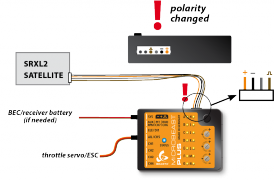
|
|
| SRXL2 satellite receiver with modified satellite connector | Modified 4-pin SRXL connector |
Never connect the 4-pin receiver connector to MICROBEAST ULTRA without modification and in wrong polarity! This will damage your receiver immediately! Check polarity at least twice before connecting the receiver to MICROBEAST PLUS. It is up to you to make sure polarity is correct. We do not assume any liability in case you do it wrong.